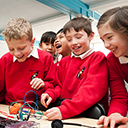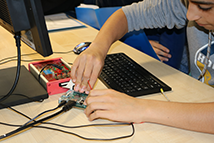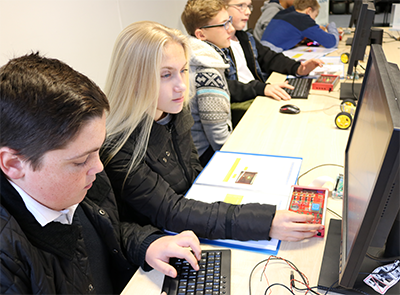Workshops

"Our workshops offer our young visitors a chance to learn something new, be creative and develop skills and are all part of the programme we offer our visiting education groups." Dr Anjali Das, Head of Learning at The Centre for Computing History |
|
|
This section will provide you with information about:
|
 |
The workshopsA workshop is part of the programme we offer visiting education groups. Your students will visit the four zones around the Centre, of which the Hauser Studio is one. It is equipped to resemble a 1980s classroom.
The workshops are led by Dr Anjali Das, our Head of Learning. The workshop will include a formal introduction, followed by a practical hands on activity supported by Anjali and paper based materials. Typically a workshop will last for approximately one hour and is repeated with typically groups of 15 students. Please make a note of the title of your workshop choice. When you book your visit online, you will be asked for your choice of ONE workshop. Programming on a Raspberry Pi The Raspberry Pi has now become the top-selling British computer of all time, zooming past 10 million units. It is an excellent educational tool and the ideal computer for budding programmers looking to experiment. We offer four workshops on the Raspberry Pi. |
|
(WS1) An Introduction to Python Programming - KS3 This workshop introduces students to Python, a versatile, modern computer language. Python is an excellent way to get into modern computer programming and can lead into more complicated languages such as Java and C++. In particular, the workshop introduces the students to basic programming concepts like Sequence, Input and Output statements, Variables, Repetition and Conditional Statements. This workshop is particularly suited for students at the lower KS3 level and satisfies the requirements of learning a text-based programming language as outlined in the Computing curriculum. |
|
(WS2) Pi Power! Controlling External Objects (Scratch) - KS2/KS3 This workshop introduces students to the concept of physical computing and demonstrates how a piece of code can affect objects outside of the computer - a vital step in understanding the function and value of computing. This addresses the expectations for the computer science aspect of the new Computing curriculum, where students (especially at KS2 and KS3 levels) are expected to develop programs that control physical systems. In this workshop, the Raspberry Pi is used to control a number of external objects - blinking LEDs, switches, buzzers, motors and more. This workshop is appropriate for KS2 and KS3. |
|
|
(WS3) Pi Power! Controlling External Objects (Python) - KS3/KS4 This workshop introduces students to the concept of physical computing and demonstrates how a piece of code can affect objects outside of the computer - a vital step in understanding the function and value of computing. This addresses the expectations for the computer science aspect of the new Computing curriculum, where students (especially at KS2 and KS3 levels) are expected to develop programs that control physical systems. In this workshop, the Raspberry Pi is used to control a number of external objects - blinking LEDs, switches, buzzers, motors and more. This workshop is appropriate for KS3 and KS4. |
|
|
(WS11) Musical Code with Sonic Pi This workshop introduces students to the Sonic Pi software package and demonstrates how you can use simple programming concepts to create music. Students will be shown how to start with producing sounds using single notes and by the end of the workshop, they should be able to create simple melodies using code. This is an excellent cross-curricular workshop that brings music-making and computing together. This workshop is particularly suited for students at the KS3 level and satisfies the requirements of learning a text-based programming language as outlined in the Computing curriculum. |
|
|
(WS13) An Introduction to Scratch Programming - KS1/KS2 This workshop introduces the students to Scratch, a block-based programming language that can be used to create interactive stories and animations. Scratch’s visual interface makes it more engaging for young learners while teaching computing concepts in a fun way. In this workshop, the students will be introduced to concepts of sequence and iteration as they write code to control a Sprite. This workshop further supports the Computing National Curriculum by helping students to understand what algorithms are, how to use logical reasoning to predict the behaviour of and debug simple programs. This workshop is suited for KS1 and KS2 children. |
|
|
(WS14) Traffic Lights with the Pibrella - KS1/KS2 This workshop provides a gentle introduction to the concept of physical computing for younger students using a popular programming language like Scratch. Physical computing helps students understand how a piece of code can affect objects outside of a computer - a vital step in understanding the function and value of computing. Students will use the Raspberry Pi and Scratch to write a program that controls the LEDs (Red, Green and Yellow) on a Pibrella Pi HAT thus emulating a basic traffic light system. Students will learn computing concepts such as using algorithms to write simple programs, how digital devices require precise instructions given in a sequence to perform a task and how to use logical reasoning to predict the behaviour of and debug simple programs. This workshop also addresses the expectations of the Computing National Curriculum for KS2 where students are expected to develop programs that control physical systems. This workshop is appropriate for students at the KS1 and KS2 level. |
|
|
(WS15) Do You Know Pico? - KS3/KS4 This workshop introduces students to the Raspberry Pi Pico microcontroller and uses the pedagogy of physical computing to demonstrate how a piece of code can affect objects outside of the computer - a vital step in understanding the function and value of computing. The Pico RP2020 microcontroller is a powerful, efficient, and affordable device capable of all sorts of wonders. Just connect it to your computer, write some code using Micropython, upload it to the Pico and you’re ready to go! The students will learn about physical systems using simple LEDs, pushbuttons, and buzzers. This addresses the expectations for the computer science aspect of the new Computing curriculum, where students (especially at the KS3 level) are expected to develop programs that control physical systems. This workshop is appropriate for students at the KS3 and KS4 levels. |
|
|
Programming on a BBC Micro Using a cluster of original 1980s Acorn BBC Micro computers in the classroom, students will gain an understanding of computer programming through a command line interface. We offer four workshops on the BBC Micro. |
|
(WS4) Amazing Algorithms - KS2 In this workshop, students are introduced to the concept of an algorithm. They learn how important it is to write a correct algorithm in order to make a computer do a particular task. The workshops starts by exploring algorithms that occur in our daily lives and then the students use this knowledge to teach a 30-year old BBC Micro computer to count! This workshop is particularly suited for students at the KS2 level and has been developed to provide a gentle introduction to text-based programming for primary students. In particular, it explores the programming concepts of Output statements, Variables and Repetition. |
|
|
(WS5) An Introduction to Programming using BBC BASIC - KS3 In this workshop, students are taught to write and understand simple computer programs in BASIC, one of the most helpful coding languages ever created. Crucially, they learn how to break down a problem into logical steps. In particular, this workshop introduces the students to basic programming concepts like Sequence, Input and Output statements, Variables, Repetition and Conditional Statements. We also explore the Sound and Graphics features offered by the BBC Micro in this workshop. This workshop is particularly suited for students at the lower KS3 level and satisfies the requirements of learning a text-based programming language as outlined in the Computing curriculum. |
|
|
(WS6) Zeroes and Ones - KS3/KS4 This workshop introduces students to binary numbers and then uses this concept to create a graphical character on the BBC Micro by turning binary digits on and off. And, if the students are keen, they can program a simple game around their character! In particular, the students will learn about the concept of structured programming using procedures and functions. This is an advanced level workshop and would be suited to higher KS3 and KS4 students who have a basic understanding of programming and experience of programming in a text-based programming language. |
|
|
(WS10) Sticks and Stones - KS4/KS5 How can we use a computer program to model a real world situation? In this workshop we use BBC BASIC to code and display the path of a projectile (both a stone and a stick) using Newton's equations of motion. Once coded we can play 'what if' games with factors like gravity, to see the effect on the projectile's path. This workshop is best suited to KS4 and above and is heavily dependent upon a student's mathematical ability to manipulate algebra within the algorithm of the BASIC program. |
|
and there is more . . . |
|
|
(WS7) Build Your Own Adventure Game - KS2/KS3/KS4 In this workshop, students will use Twine, a free online program, to build their own text-based adventure games. The workshop introduces them to the basics of interactive narrative and game design, and challenges them to convert their creativity into functioning code, using both Twine's custom syntax and HTML. As Twine runs on any simple computer, students can easily take their projects away with them to continue later. This workshop supports the Computing curriculum as well as contributing to the creative writing aspects of the English curriculum. |
|
(WS8) Conducting Carrots with the Makey-Makey - KS2 In this workshop, students will work with an ingenious little device called the Makey-Makey that allows everyday items to be connected to a computer! Students are given a variety of objects, from playdoh to carrots which they use and find out if they can be used as 'keys' (to send input to a computer) or not. This then leads to discussion about what electricity is and which objects conduct electricity and which don’t. This is a lively science and computing based workshop for KS2 children which aims to teach the principles of circuits, resistance and conductivity. This workshop supports the Computing curriculum as well as contributing to the electricity aspects of the Science curriculum. |
|
(WS9) Do You Know Arduino? - KS3/KS4 In this workshop, students will work with Arduino boards and experiment with controlling all sorts of things in the physical world. Arduino is a brilliantly simple device that students can use to build electronics projects easily, thus allowing them to explore physical computing in just a few simple steps. They can connect the Arduino board to their computer, write some code using the Arduino software (primarily manipulating the in-built examples), upload it to the board and the project is ready to go! The students will learn about physical systems using simple LEDs, pushbuttons, motors and motor controllers. This workshop addresses the expectations for the computer science aspect of the new Computing curriculum, where students (especially at KS3 level) are expected to develop programs that control physical systems. This workshop is particularly suited for students at the KS3 and KS4 levels who have had prior experience of programming using a text-based programming language. |
|
(WS12) Musical Computers - KS1/LKS2 In this workshop, students are the 'computer' and will build an orchestra with a slight twist! Students will be given a musical instrument each and the activity leader will give instructions to create a rhythm together. If they follow the instructions haphazardly, the students create noise but if they do it well, as a computer would, they create music! The aim is to introduce programming concepts such as sequence, repetition and decomposition in a fun and engaging way. This is a lively workshop for KS1 and LKS2 children which encourages computational thinking skills. This workshop supports the National Computing curriculum and students will gain an understanding of what algorithms are and how to use logical reasoning to predict the behaviour of and debug simple programs.
|
|
|
The Centre for Computing History is proud to support schools and colleges delivering a curriculum which is working to achieve a world-leading education for all young people in science, technology, engineering and mathematics |
 |

 When you book your visit you will be asked to choose
When you book your visit you will be asked to choose 







